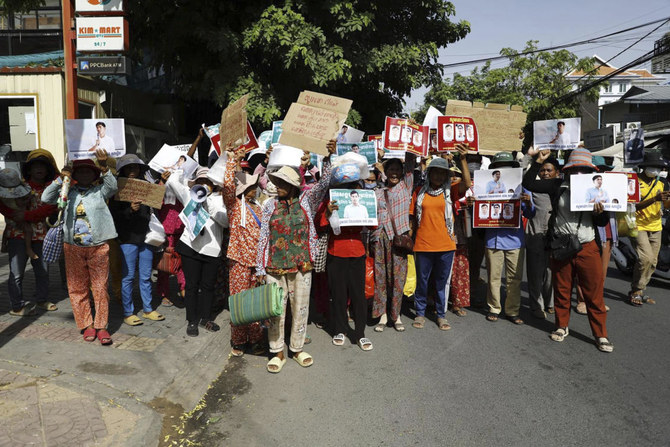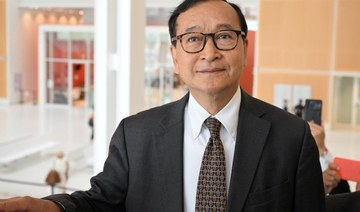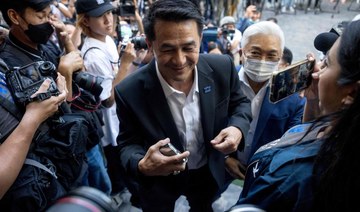PHNOM PENH: Three Cambodian land rights activists who were arrested on charges of plotting against the government planned to provoke a peasant revolution by teaching farmers about class divisions between rich and poor, an official said Tuesday.
Theng Savoeun, president of the Coalition of Cambodian Farmer Community, and his colleagues Nhel Pheap and Than Hach were charged Monday by a court in the country’s northeast with plotting against the state and incitement to commit a felony, said Am Sam Ath of the local rights group Licadho.
He said plotting against the government carries a possible prison term of five to 10 years, while incitement to commit a felony is punishable by six months to two years. He described the charges as sending “a message of intimidation” to civil society groups.
The three suspects were not available for comment and their lawyers were not immediately reachable.
A senior government official likened their nonviolent activities to what the communist Khmer Rouge taught peasants five decades ago before carrying out their bloody revolution.
The arrests in Ratanakiri province came as Cambodia prepares for a general election in July that is certain to return to power the governing Cambodian Peoples Party of Prime Minister Hun Sen, who has led the country for 38 years with little tolerance for dissent. The opposition Candlelight Party, the sole group posing a credible challenge to the governing party, was not allowed by the National Election Committee to contest the polls and expects a ruling this week on its appeal of that decision.
The three activists were arrested on May 17 after hosting a workshop in Ratanakiri province about land rights and other issues affecting farmers. The police detained 17 of the workshop’s 39 participants but released all but the three, who were charged and placed in pre-trial detention on Monday.
Interior Ministry spokesperson Gen. Khieu Sopheak said the three were arrested because their activities violated the law and were outside the main goals of their organization, which he said were to teach farmers more productive agricultural techniques.
He said the workshop instead discussed political issues such as the division between rich and poor and how to incite farmers to hate the rich.
“Their lecture was to teach about peasant revolution, about the class divide in society,” Khieu Sopheak said. He said such language mirrored the ideology taught by the communist Khmer Rouge to poor farmers, especially in Ratanakiri province, in the early days of their revolutionary struggle before taking power in April 1975.
The brutal Khmer Rouge regime, which was ousted in 1979, is blamed for the deaths of an estimated 1.7 million Cambodians from starvation, illness and killing.
Hun Sen joined the Khmer Rouge in 1970 when it was fighting against a pro-American government but defected from the group in 1977 and allied himself with a resistance movement backed by neighboring Vietnam.
“Fabricating these bogus charges against prominent civil society leaders shows how far the government is willing to go to silence critics in advance of the Cambodia elections in July,” Phil Robertson, deputy Asia director at Human Rights Watch, said in a statement issued Wednesday. “There needs to be a chorus of international condemnation targeting Prime Minister Hun Sen and his government to demand an end to these intimidating tactics.”
Land grabs by wealthy and influential people have been a major problem for many years in Cambodia. Land ownership was abolished during the rule of the Khmer Rouge and land titles were lost, making ownership a free-for-all when the communist group lost power. Under Hun Sen’s government, much land that had been resettled was declared state land and sold or leased to wealthy investors, many of whom critics said were cronies of the governing party. Security forces have been employed to help evict tenants from such areas.
Khieu Sopheak said the three land activists admitted their crimes during police interrogation and that the authorities had found evidence of their activities on a computer and in documents from the group’s training workshop.
However, according to the Cambodian Center for Human Rights, “They were initially denied access to legal representation, before their lawyer was eventually allowed to be present as they were being interrogated by the prosecutor” on May 22.
A statement on Theng Savoeun’s Facebook page said, “In this life, we have tasted all sorts of flavors, but we remain firmly strong because our daily work is not what they have accused of us, rather we work at basic humanitarian tasks, helping the victims, helping farmers, helping the community, to make them understand their rights and obligations, and to help them find a solution.”
Farmers from other provinces who support the three activists have defied official harassment to travel to Phnom Penh to stage protests in front of the Interior Ministry demanding their release.
Rights worker Am Sam Ath expressed his concern that the three face such serious charges for working for the benefit of farmers and their communities. He said it might make it harder to help farmers in the future.
Cambodian land activists arrested for allegedly inciting farmers to hate the rich
https://arab.news/6vxd6
Cambodian land activists arrested for allegedly inciting farmers to hate the rich

- The activists were arrested after hosting a workshop about land rights and other issues affecting farmers
- Police detained 17 of the workshop’s 39 participants but released all but the three who were charged and placed in pre-trial detention
‘Hindu nation’: Religion trumps caste in India vote

AGRA, India: Born at the bottom of the Hindu faith’s rigid caste system, voters like Anil Sonkar will determine whether Indian Prime Minister Narendra Modi returns to power next month.
More than two-thirds of India’s 1.4 billion people are estimated to be on the lower rungs of a millennia-old social hierarchy that divides Hindus by function and social standing.
Politicians of all stripes have courted lower caste Indians with affirmative action programs, job guarantees and special subsidies to mitigate long-standing discrimination and disadvantage.
But Modi’s Hindu-nationalist Bharatiya Janata Party (BJP) has established itself as India’s dominant political force with a different pitch: think of your religion first, and caste second.
“There are no economic opportunities and business has never been so bad for me,” said Sonkar, a 55-year-old fishmonger and a member of the Dalit castes, once disparagingly known as “untouchables.”
“But under this government, we feel safe and proud as Hindus,” he told AFP in the tourist city of Agra, home of the Taj Mahal. “That is why, despite everything, I voted for Modi.”
Modi’s party is expected to easily win this year’s national election once it concludes in June, in large part due to his government’s positioning of the Hindu faith at the center of its politics.
His government has been accused in turn of marginalizing the country’s 200-million-plus Muslims, leaving many among them fearful for their futures in India.
But its strategy of appealing to pan-Hindu unity, and directing the faith’s internal frictions outwards, has reaped political dividends.
“The BJP’s base among the marginalized has grown over every election since 2014,” political scientist and author Sudha Pai told AFP.
The party, she added, had successfully forged a new pan-Hindu political coalition by showing respect to the “cultural symbols, icons and history” of low-caste voters, and in the process furthering its goal of building a “Hindu nation.”
Caste remains a crucial determinant of one’s station in life at birth, with higher castes the beneficiaries of ingrained cultural privileges, lower castes suffering entrenched discrimination, and a rigid divide between both.
Modi himself belongs to a low caste, but the elite worlds of politics, business and culture are largely dominated by high-caste Indians.
Less than six percent of Indians married outside their caste, according to the country’s most recent census in 2011.
Modi’s political coalition has managed to bridge this internal divide by trumpeting a vision of a resurgent and assertive Hindu faith.
The prime minister began the year by inaugurating a grand temple to the Hindu deity Ram, built on the site of a centuries-old mosque razed by Hindu zealots decades earlier.
Construction of the temple fulfilled a long-standing demand of Hindu activists and was widely celebrated by Hindu voters, whatever their caste group.
Modi’s rise also coincided with the declining fortunes of caste-based political parties that had dominated politics for decades in Uttar Pradesh, India’s most populous state with more people than Nigeria and its most important electoral battleground.
Many in the state accused these parties of directing welfare programs and other benefits of political power to their own caste groups, a situation they say changed when Modi came to power and made them available for all disadvantaged voters.
“The soles of my slippers wore off as I ran around trying to get a card for free rations,” homemaker Munni Devi, 62, told AFP at a BJP campaign rally over the din of frenzied drum beats and music.
“But Modi gave me one immediately after coming to power,” she told AFP.
The BJP has been able to unite a broad array of caste groups into a single bloc of support, but caste discrimination remains a fact of life both in politics and society at large.
Despite Modi’s own low-caste origins, the senior ranks of his ministry, party and civil service remain overwhelmingly dominated by upper-caste functionaries.
“Our lawmaker is from our caste and from the BJP,” said farmer Patiram Kushwaha, a Modi supporter reconsidering his allegiance.
“He cannot do anything for us because those sitting at the top don’t listen to him.”
More than two dozen opposition parties in this year’s poll have campaigned on a joint pledge to address the structural causes of discrimination by staging a caste-based national census and redirecting resources to the most disadvantaged.
Analysts nonetheless expect Modi to triumph convincingly over the opposition bloc, but Neelanjan Sircar, of the Center for Policy Research think-tank in New Delhi, said the BJP faced a monumental challenge in holding its coalition together over the long term.
“This balancing act of keeping together groups which don’t really get along with each other is extremely tough in the long run,” he told AFP. “At some point, you have to face the demons of those contradictions.”
UN reports improved prospects for the world economy and forecasts 2.7 percent growth in 2024

- The mid-2024 report says the world economy is now projected to grow by 2.7 percent this year and by 2.8 percent in 2025
UNITED NATIONS: The United Nations reported improved prospects for the world economy since its January forecast on Thursday, pointing to a better outlook in the United States and several large emerging economies including Brazil, India and Russia.
According to its mid-2024 report, the world economy is now projected to grow by 2.7 percent this year – up from the 2.4 percent forecast in its January report – and by 2.8 percent in 2025. A 2.7 percent growth rate would equal growth in 2023, but still be lower than the 3 percent growth rate before the COVID-19 pandemic began in 2020.
“Our prognosis is one of guarded optimism, but with important caveats,” Shantanu Mukherjee, director of the UN’s Economic Analysis and Policy Division, told a news conference launching the report.
The report pointed to interest rates that are higher for longer periods, debt repayment challenges, continuing geopolitical tensions and climate risks especially for the world’s poorest countries and small island nations.
Mukherjee said inflation, which is down from its 2023 peak, is both “a symptom of the underlying fragility” of the global economy where it still lurks, “but also a cause for concern in its own right.”
“We’ve seen that in some countries inflation continues to be high,” he said. “Globally, energy and food prices are inching upward in recent months, but I think a bit more insidious even is the persistence of inflation above the 2 percent central bank target in many developed countries.”

The UN forecast for 2024 is lower than those of both the International Monetary Fund and the Organization for Economic Cooperation and Development.
In mid-April, the IMF forecast that the world economy would continue growing at 3.2 percent during 2024 and 2025, the same pace as in 2023. And the OECD in early May forecast 3.1 percent growth in 2024 and 3.2 percent in 2025.,
The latest UN estimates foresee 2.3 percent growth in the United States in 2024, up from 1.4 percent forecast at the start of the year, and a small increase for China from 4.7 percent in January to 4.8 percent. for the year.
Despite climate risks, the report by the UN Department of Economic and Social Affairs forecasts improved economic growth from 2.4 percent in 2023 to 3.3 percent in 2024 for the small developing island nations primary due to a rebound in tourism.
On a negative note, the report projects that economic growth in Africa will be 3.3 percent, down from 3.5 percent forecast at the beginning of 2024. It cited weak prospects in the continent’s largest economies – Egypt, Nigeria and South Africa – along with seven African countries “in debt distress” and 13 others at “high risk of debt distress.”
Mukherjee said the lower forecast for Africa “is particularly worrying because Africa is home to about 430 million (people) living in extreme poverty and close to 40 percent share of the global undernourished population” and “two-thirds of the high inflation countries listed in our update are also in Africa.”
For developing countries, he said, the situation isn’t “as dire” but an important concern is the continuing fall and sharp decline in investment growth.
Japan, US move ahead in co-developing hypersonic weapons interceptor as regional threats grow

TOKYO: Japan and the United States on Wednesday signed an arrangement to jointly develop a new type of missile defense system as the allies seek to defend against the growing threat of hypersonic weapons, which are possessed by China and Russia and being tested by North Korea.
The project was initially agreed between Japan’s Prime Minister Fumio Kishida and US President Joe Biden at their summit last August and reaffirmed between the leaders during Kishida’s April visit to Washington. The Glide Phase Interceptor is planned for deployment by the mid-2030s.
Wednesday’s agreement determines the allocation of responsibility and decision-making process, a first major step in the project, Japanese defense ministry officials said. They hope to decide on Japanese contractors and start the development process by March 2025.
Hypersonic weapons are designed to exceed Mach 5, or five times the speed of sound, posing a threat to regional missile-defense systems with their speed and maneuverability. Developing interceptors of them is a challenge.

Japan’s defense ministry called it a “pressing issue” and noted that hypersonic weapons in the region have dramatically improved in recent years.
Under the arrangement, Japan is responsible for developing a part at the interceptor’s tip that separates in space to destroy the incoming warhead, as well as its rocket motors, officials said.
Japan has earmarked 75.7 billion yen ($490 million) for initial development and testing of the interceptor, according to the defense ministry.
The cost includes making components for the two companies, Raytheon Technologies and Northrop Grumman, that are developing the weapon in a competition led by the US Missile Defense Agency. One will be chosen for the project.
The MDA has estimated the cost to develop the hypersonic missile interceptor will exceed $3 billion, including Japan’s share of $1 billion.
The interceptors will be deployed on Aegis-class destroyers, like the ship-to-air Standard Missile-3 that Japan previously co-developed with the United States.
Japan has been accelerating its miliary buildup as it stresses the need to fortify its deterrence against growing threats. Japan has also significantly eased its weapons export policy to allow co-developed lethal weapons to third countries.
___
This story has been corrected to say GPI stands for Glide Phase Interceptor, not Glide Sphere Interceptor.
___
Follow AP’s Asia-Pacific news at https://apnews.com/hub/asia-pacific
Using frozen Russian assets for Ukraine must align with law, Japan says

TOKYO: Japanese Finance Minister Shunichi Suzuki said on Friday it is important that discussions will be aligned with international law when asked about a US proposal for using the interest derived from frozen Russian assets to aid Ukraine.
“Japan plans to join the discussions at the upcoming Group of Seven meeting from this basic standpoint,” Suzuki said.
Senegalese prime minister criticizes French military bases on territory

- “I reiterate here the desire of Senegal to have its own control, which is incompatible with the lasting presence of foreign military bases in Senegal," PM Sonko said
- Neighbours Mali, Burkina Faso and Niger have pushed out French troops and turned to Russia for help fighting jihadist insurgencies on their territory
DAKAR: Senegal’s prime minister Ousmane Sonko raised the possibility of closing French military bases in the West African country on Thursday in a wide-ranging speech that also touched on the euro-backed CFA franc currency, oil and gas deals and LGBTQ rights.
Sonko, a firebrand politician who gained power when his hand-picked presidential candidate Bassirou Diomaye Faye won a decisive victory in March, is known for criticizing perceived overreach by France in its former colony.
France has about 350 troops in Senegal.
“More than 60 years after our independence ... we must question the reasons why the French army for example still benefits from several military bases in our country and the impact of this presence on our national sovereignty and our strategic autonomy,” Sonko said at a joint conference with the French left-wing politician Jean-Luc Melenchon in the capital Dakar.
“I reiterate here the desire of Senegal to have its own control, which is incompatible with the lasting presence of foreign military bases in Senegal ... Many countries have promised defense agreements, but this does not justify the fact that a third of the Dakar region is now occupied by foreign garrisons.”
Neighbours Mali, Burkina Faso and Niger have pushed out French troops and turned to Russia for help fighting jihadist insurgencies on their territory.
They have also turned away from West African bloc ECOWAS — which condemned their coups — and formed their own alliance of Sahel states.
But Sonko had friendly words for them on Thursday.
“We will not let go of our brothers in the Sahel and we will do everything necessary to strengthen the ties,” he said.
He also said Senegal, which shares the euro-pegged CFA franc currency with seven countries, would like a flexible currency pegged to at least two currencies to help absorb shocks and support export competitiveness.
During the election campaign, Faye had initially pledged to abandon the CFA franc but later backed off his promise.
Sonko reiterated promises to renegotiate oil and gas contracts in Senegal, where production is due to begin this year.
He also called on Western countries to show “restraint, respect, reciprocity and tolerance” on social matters including LGBTQ rights and gender equality.
He said homosexuality had always existed in Senegal, but the country had “managed” it and would continue to do so according to its socio-cultural realities.
“Senegal and many other African countries cannot accept any truth in legalizing this phenomenon.”




















